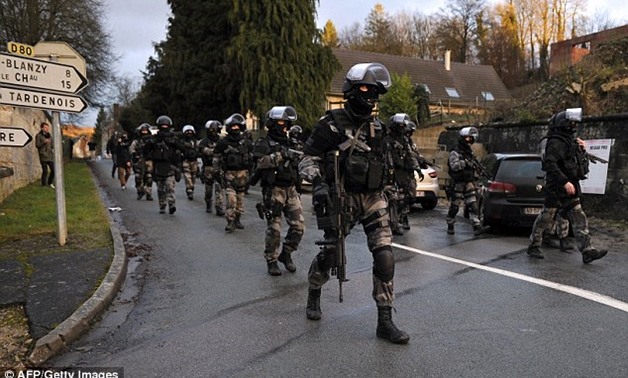
Members of the GIPN and RAID, French police special forces, walk in Corcy, northern France, as they carried out searches as part of an investigation into a deadly attack. AFP
CAIRO – 18 October 2017: The world has seen a major rise in Islamic terrorism in recent years as conflict in Syria and Iraq has provided a breeding ground for discontent and extremist beliefs, which hastranscended national borders and struck fear into the hearts of people around the world.
This reality was highlighted by Andrew Parker, the director general of MI5, on Tuesday during a rare public speech. MI5, the British domestic intelligence agency, operates alongside the internationally focused MI6 and the communications agency, GCHQ.
The UK has seen “a dramatic up-shift in the threat” from Islamic terrorism this year the sky chief said. “That threat is multi-dimensional, evolving rapidly and operating at a scale and pace we’ve not seen before.”
“It’s at the highest tempo I have seen in my 34-year career. Today there is more terrorist activity, coming at us more quickly, and it can be harder to detect.”
This declaration came as a shock to many; not because of the content of the message, but the delivery of the message itself. The MI5 is a highly secretive intelligence agency, and any public appearances are few and far between.
Europe has experienced a significant rise in Islamic terrorism in the past several years. The Global Terrorism Index report for 2015 indicated a 650 percent increase in deaths due to terrorism in OECD countries, which marked an important rise in transnational terrorist attacks.
The UK alone has experienced four Islamic terrorist attacks in 2017; denoting a huge shift from the past.
What is most unique about the recent surge in Islamic terrorism in Europe is the multifaceted attacks. Vehicles have proven to be the chosen weapon of destruction adopted; however, guns, knives and explosive devices have also made an appearance. The UK has experienced every kind of attack since New Year’s.
Europe certainly isn’t the only region forced to endure this however, as many Middle Eastern and African states have also experienced a major incline in terrorism. Obvious examples include Syria and Iraq, where the Islamic State established an expansive stronghold and exuded significant influence across vast swathes of both countries through fear and psychological warfare.
 Somali government forces and civilians gather at the scene of an explosion in KM4 street in the Hodan district of Mogadishu, Somalia October 15, 2017. REUTERS/Feisal Omar
Somali government forces and civilians gather at the scene of an explosion in KM4 street in the Hodan district of Mogadishu, Somalia October 15, 2017. REUTERS/Feisal Omar
Several other territories across the Middle East failed to make headlines in western media, yet have an extensive experience with the crippling effects of Islamic terrorism.
The foremost example being the war in Yemen, where the predominantly Houthi rebel movement faces a superior foe in the Saudi Armed Forces, which have leveled villages and created a breeding ground for religious extremism. Egypt’s Sinai Peninsula and Libya are also experiencing a long-fought battle against religious terrorism.
Islamic terrorism has spread from its origins in the Middle East and taken hold of several African states such as the Central African Republic, Nigeria and Somalia among other examples; where extremist Islamic ideologists have seized the opportunity to capitalize upon chronic dissatisfaction in the many failed states across the continent.
The recent conflict in Kirkuk shares many similarities with the circumstances which have led to the rise of Islamic terrorist organizations across the region. The presence of an aggressive and sectarian overseer who initiates a rule through fear and abuse, which leads to the discontent of the population breeding a fire of hatred with both their oppressor, and the international community who fails to intervene, thus giving their blessings to the oppressor.
The lack of action on the international community’s behalf, and most significantly the U.S. who has chosen to stay neutral in the dispute of two of its major allies in the region, will lead to a growing distaste for the U.S., who has already seen its influence in the region reduced.
The international community must learn from the past and adopt the unbiased position of mediator; avoiding using force and imposing foreign and unviable ideas. However, the silence of the international community is far more worrying.
Twitter:


Comments
Leave a Comment